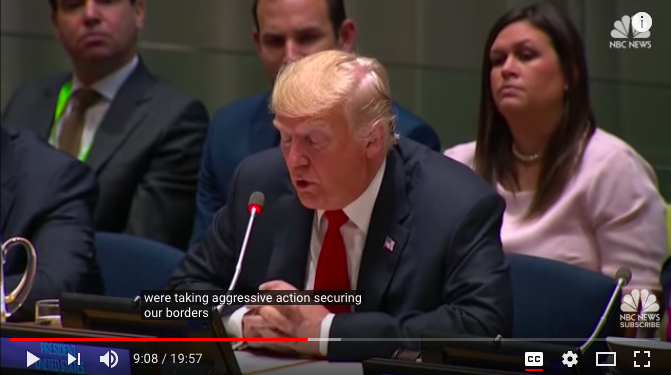On September 24, President Trump welcomed the United Nations General Assembly to a “High-level Event on Counter Narcotics,” where he presented his “Global Call to Action on the World Drug Problem,” a one-page document co-signed by 129 other member nations of the UN.
The “Call to Action” draws attention to “newly emerging synthetic drugs,” like fentanyl, and pledges the signatories to a “four-pronged” strategy of increasing education about addiction, expanding treatment, strengthening “international cooperation across judicial, law enforcement, and health sectors,” and “cut[ting] off the supply of illicit drugs by stopping their production, whether through cultivation or manufacture, and flow across borders.”
The last “prong” is clearly of central interest to Trump. “As we know, illicit drugs are linked to organized crime, illegal financial flows, corruption, and terrorism,” he said in his remarks to the General Assembly. “It’s vital for public health and national security that we fight drug addiction and stop all forms of trafficking and smuggling that provide the financial lifeblood for vicious transnational cartels.”
U.N. Secretary-General António Guterres echoed Trump’s drug war rhetoric, urging the members of the General Assembly to continue:
“…cracking down on drug trafficking and those who profit from human misery. That means denying a safe haven to drug traffickers—and better cross-border cooperation to pursue kingpins and dismantle networks.”
Regarding the need to strengthen treatment programs, Guterres said, “Consumers are first and foremost patients and victims.” “Victims,” presumably, of criminals, who must be targeted by law enforcement. Even as the “Call to Action” vaguely gestured towards public health, the militarized approach to drug trafficking and supply was forefronted.
And that’s perhaps why New Zealand Prime Minister Jacinda Ardern did not sign the document. “We have a number of challenges that are quite specific to New Zealand and the particular drugs that are present, but also [we are set] on taking a health approach,” Ardern told reporters. Ardern’s vocal emphasis on “taking a health approach” as her reason for not signing the pledge suggests that she saw that the “Call to Action” represented something different.
Among other nations that declined to sign on to Trump’s plan were Norway and South Africa, which decriminalized the private use of cannabis just last week.
The Global Commission on Drug Policy, a Geneva-based group of world leaders including former presidents and prime ministers, sharply criticized Trump’s “Call to Action,” writing that it “signals the continuation of inefficient, costly and harmful policies.”
The War on Drugs is “expensive and counter-productive,” they wrote, and “The US government, which tried and abandoned alcohol prohibition, and now faces an unprecedented opioid crisis, should know this better than anyone.”
Photo: Trump speaks at the U.N. Event on drugs via NBC News





Show Comments